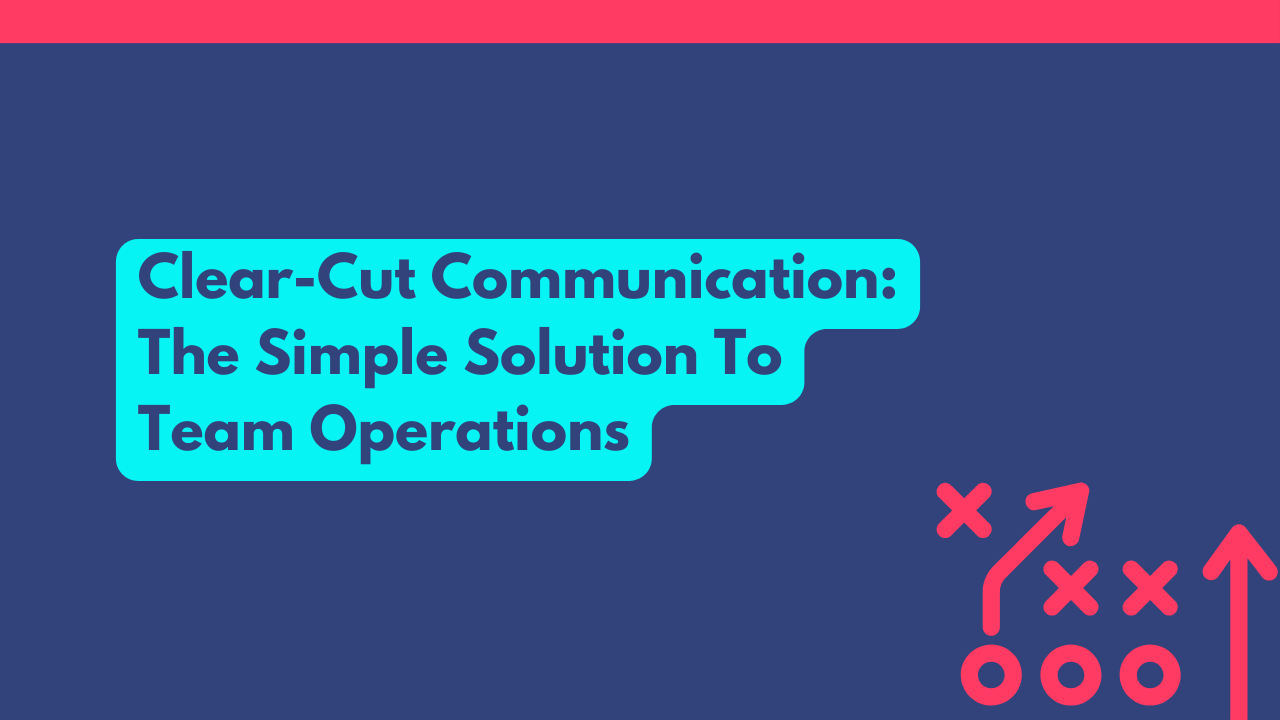Clarity in Communication: The Key to Simplifying Team Operations
Oct 03, 2023
What if I told you that solving your team operation woes is actually so much simpler than you think?
One of the things that I hear so much when I talk about helping business owners optimize their team operations is, sadly, that people don’t want to think about that side of the business because it’s “too complicated.”
If you’re in that camp, I want to help you shake that perspective today. The reality is, is that team operations are about simplifying everything. They’re about making it easier to get your work done. It’s actually the opposite of complicated!
Listen on Apple | Listen on Google | Listen on Spotify
The Intimidating Part
So, why do people think that it's too complicated? Usually, it’s because they tried to introduce something to “streamline” and simplify team operations before, but because they didn’t go about it quite right, it ended up feeling a lot more complicated than it should have been.
I think many business owners have experienced this, so let me give an example: maybe we’ve introduced something new to try to solve problems, like a work tracking system or a timesheets tracker, and it’s actually more complicated and cumbersome than expected. Instead of finding something that just had the needed functions, we got something that has all the bells and whistles.
I've heard this happen with things like ClickUp, Asana, even Slack. All these programs are very robust. They do tons of things…and that actually becomes the problem.
In this case, we're trying to solve every single problem with this one program and all its features, even if those features aren’t best suited to our particular business’s needs.
In addition to that, we're trying to get people up and running on that system quickly, but we often skip steps. We haven't really trained people how to use it; we just tell them we're going to use this new system to track things, and we leave them to adapt on their own.
So instead of speeding up your team operations and solving issues, this switch has actually slowed people down. It actually made things more complicated, and so your team quickly becomes frustrated. They don’t want to use this new software, because it’s making everything difficult.
Rolling out a complicated system that's supposed to solve everyone's problems often doesn’t work, b because we often don’t share why we’re shifting, nor do we want to take the time to really train people to use the system. Instead, we leave them to sink or swim.
Now, our team members will often swim; they’ll eventually get the hang of it, but it will take a lot of time and trial and error before they do. And then they—and we—get left with this idea that adjusting processes is super complicated.
It ends up discouraging us from looking more closely at our team operations the way we need to, and it also makes our team less willing to embrace changes to our methods.
We don't want to do that—not to them or to ourselves.
Another issue that can make team operations feel complicated is when we haven't taken the time to sit and diagnose what problems we actually want to solve and what the best way to do that would be.
Instead, we implement a bunch of processes that end up feeling pretty heavy-handed, and again, we don’t take the time to explain the “why” behind it.
For example, I was working in a team where we didn't have a system for how to track our work. And when we started to shift to try and solve that issue, right out of the gate, a lot of the designers that I was working with said, “Well, I don't want to feel like I'm being monitored or that all my work is under a microscope. I want to make sure I have time to ideate freely.”
One of the assumptions that was kicking in there was that if we lifted the hood up and started looking at how work was getting done, we would start making the process too rigid, and that assumption is one of those things we want to shift. Because when I introduced the work tracking system and carefully communicated what was in it for them and how to make it easier, it ended up making things much easier, which was always the intention. But we had to first bust that erroneous assumption.
The third thing that folks can run into that makes team operations feel complicated is if you hire a consultant that doesn’t fit your needs.
Maybe you've hired a consultant or have someone working on team operations, and they start uncovering all these different problems. They then write a report or give you a readout and tell you that you’ve got to fix everything about your business, but they just give you the problems without solutions.
No one should be presenting problems without coming up with solutions. That's not helpful. But we often work with folks who don't present solutions, and you're supposed to figure that half out on your own, which leaves you hanging.
Or, another option: maybe you hired a consultant, and the problem diagnosis cost one thing, but the implementation of solutions was where they really made their money, and they left you hanging on that side.
That can be incredibly frustrating, especially if you don't have the funds to be able to fund the implementation. We end up feeling as though we've unearthed all these problems that we have to solve, but we don't have the budget or the skillset to solve it.
The Beating Heart
With all these potential problems cropping up, I’m not surprised most people feel like they don't want to even go near team operations. But it doesn’t have to be this way.
The reason I'm bringing these things up is because the heartbeat of your team, the way to make things run more smoothly, is through having a lot of clarity.
With all examples except for bringing on a consultant, the solution to that complication is communicating as clearly as you can with your team.
There's nothing more important. And if you aren’t sure how to get clear about things with your team, you want to stick around this space—everything I talk about on Managing Made Simple is about clarifying the “How.”
It’s about clarifying how we talk about expectations, about delegating, about feedback, about priorities, and so much more.
All of this ties into how things are done in a team, because when team members understand what success looks like for them and the business as a whole, what the priorities are, how decisions are made and communicated, when we come together as a team and meet…when everyone's really clear on those expectations, they can finally be firing on all cylinders.
If you know there are sticking points in your processes, but you keep telling yourself it’s something you can solve later, I urge you to reframe that thinking.
We always want to be working proactively as business owners. The worst time to solve a problem with team workflows is when four or five people have already left the team due to dysfunction, and it’s a huge disaster on top of you trying to hire and having multiple people covering jobs meant to be done by two separate people.
Many people reach out wanting my Ops Playbook to solve their team operations issues when there's already a burning fire that they're trying to put out.
The truth is, the best time to work on your team operations is when things are working effectively so that you can keep that ship running as you’re plotting adjustments and rooting out potential problems.
If you’re feeling like you don't know when and how to invest in assistance getting your team operations under control, the moment is now, because that's what's going to keep your momentum up and allow you to hit that next milestone.
When we start to plateau, it's often because we didn't fix things that would have been easy course corrections earlier, and now we're going to have to move a much bigger ship. We’ll have to make changes that feel much bigger and much more costly.
If you can identify those issues when they’re baby sprouts instead of giant weeds choking out the whole garden, it will be infinitely easier to get them under control.

If It Feels Complicated, It’s The Wrong Solution
As nerve-wracking as it can be, we want to peek under the hood of our business early, because we’ll be able to catch a lot of small issues that are actually really simple that we can then solve before they grow into something catastrophic.
Solutions to your team operation woes are simple. If you feel like it’s over-complicated, if you feel like whatever you're going to introduce is adding so much complexity that you need a whole person to run it or roll it out, that's a signal that your chosen solution isn't the right one.
I assure you from over a decade of experience driving team operations in large companies that even when there’s an overwhelming amount of moving parts, the solutions are always so much simpler than you make them out to be.
We think we want to use complicated strategic thinking for where our business is going to go, but we don't have to overcomplicate making it easier to get work done. We really don't.
So, all that to say, I urge you to embrace looking at your team operations instead of avoiding them. Ask yourself where there might be some shifts you can make, and don’t be afraid to get support in that if you need it. As the visionary of your business, as the big-picture thinker, your zone of genius is centered on driving that business to the next level. Sometimes those minute details can be more difficult, so get that support you need for the team operations portion…just make sure it’s the right support!
People who give you problems without solutions…those aren’t the people you want in your corner. You need someone who can help with identifying problems and solving them.
That’s my whole area of expertise. I love helping you, the visionary, translate what's in your mind and get it down on paper. And once you do that, you’ll have a plan that everybody understands, that your entire team is going to buy into, and that's how you scale.
WORK WITH LIA:
If you are ready to save 30+ hours per month with my system for streamlining your team operations? Schedule your FREE Scale-Up Strategy call today, where we can dive into specifics of your business and shifts you can make right away to save you time and money.
Schedule your Scale-up Strategy Call here!
CONNECT WITH LIA:
Website: https://www.liagarvin.com/
Instagram: https://www.instagram.com/lia.garvin/





